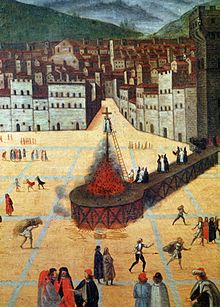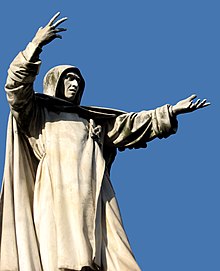Girolamo Savonarola
Appearance

Girolamo Savonarola (September 21, 1452 – May 23, 1498) or Jerome Savonarola was an Italian Dominican friar from Ferrara and preacher active in Renaissance Florence. He was known for his prophecies of civic glory, the destruction of secular art and culture, and his calls for Christian renewal. He denounced clerical corruption, despotic rule, and the exploitation of the poor.
Quotes
[edit]

- The reason why I entered into a religious order is this: first, the great misery of the world, the wickedness of men, the rapes, the adulteries, the thefts, the pride, the idolatry, the vile curses, for the world has come to such a state that one can no longer find anyone who does good; so much so that many times every day I would sing this verse with tears in my eyes: Alas, flee from cruel lands, flee from the shores of the greedy. I did this because I could not stand the great wickedness of the blind people of Italy, especially when I saw that virtue had been completely cast down and vice raised up.
- Letter to his father (25 April 1475), as quoted in A Guide to Righteous Living and Other Works (2003) as translated by Konrad Eisenbichler, p. 17 ISBN 0772720207 ISBN 978-0772720207
- Ecce gladius Domini super terram, cito et velociter.
- Behold the sword of the Lord will descend suddenly and quickly upon the earth.
- Motto he beheld in a vision (December 1492), as quoted in History of the Christian Church, Vol. V (1910) by Philip Schaff, and David Schley Schaff p. 688
- Behold the sword of the Lord, swift and sure, over the earth.
- As quoted in Books: The Sword of God" in TIME (17 August 1959)
- Behold the sword of the Lord will descend suddenly and quickly upon the earth.
- Colui che scomunica me scomunica Dio.
- Whoever excommunicates me, excommunicates God.
- A History of the Church: The Revolt Against the Church: Aquinas to Luther, (1947, 1979, 1993), by Philip Hughes, Vol. 3, p. 493 Google books file ISBN 0722079834 ISBN 9780722079836
- The Pope may err, and that in two ways, either because he is erroneously informed, or from malice. As to the latter cause we leave that to the judgment of God, and believe rather that he has been misinformed. In our own case I can prove that he has been falsely persuaded. Therefore any one who obstinately upholds the excommunication and affirms that I ought not to preach these doctrines is fighting against the kingdom of Christ, and supporting the kingdom of Satan, and is himself a heretic, and deserves to be excluded from the Christian community.
- Sermon (18 February 1498), as translated in History of the Popes (1901) by Ludwig Pastor, as translated by Frederick Ignatius Antobus, Vol. 6, p. 26
- God is the best helper, but He loves to be helped. Be earnest in prayer, but do not neglect human means. You must help yourself in all manner of ways, and then the Lord will be with you.
- Reported in Dictionary of Burning Words of Brilliant Writers (1895) edited by Josiah Hotchkiss Gilbert, p. 124
- Do you wish to be free? Then above all things, love God, love your neighbor, love one another, love the common weal; then you will have true liberty.
- Reported in Dictionary of Burning Words of Brilliant Writers (1895) edited by Josiah Hotchkiss Gilbert, p. 378
- Elegance of language must give way before simplicity in preaching sound doctrine.
- Reported in Dictionary of Burning Words of Brilliant Writers (1895) edited by Josiah Hotchkiss Gilbert, p. 481
- I am the hailstorm that shall break the heads of those who do not take shelter.
- As quoted in Books: The Sword of God" in TIME (17 August 1959), a review of The Life Of Girolamo Savonarola by Roberto Ridolfi, translated by Cecil Grayson
- Io vi conforto di convertirvi a Dio, vivere come è obbligato ogni buon cristiano, dolervi del passato e ridurvi alla pietà. Altrimenti, io vi annunzio che è sopra di voi imminente un gran flagello, e sarete flagellato nella roba, nella persona e nella casa vostra.
Vi annunzio ancora, che della vostra vita ce n' è per poco; che, se non farete quel che vi dico, anderete nell'inferno; e questa lettera vi sarà presentata innanzi al tribunale di Dio, nè vi potrete scusare.- I counsel you to return to God, to live after the manner of a good Christian, to repent the past, and recur to piety. Otherwise, I make known to you that severe chastisement awaits you, and that you shall be scourged in your substance, your flesh, and your kindred.
Likewise I announce to you that your life is near its end; that if you obey not my words, you will go to hell, and this letter will be brought up against you before the judgment-seat of God, and leave you no way of escape.- To the prince of Mirandola, Count Galeotto Pico, brother of Giovanni Pico della Mirandola (26 March 1496), as quoted in Life and Times of Girolamo Savonarola (1888) by Pasquale Villari, translated by Linda Villari, p. 442; also in Le lettere di Girolamo Savonarola (The letters of Jerome Savonarola), 1933, Roberto Ridolfi, L. S. Olschki, p. 107.
- I counsel you to return to God, to live after the manner of a good Christian, to repent the past, and recur to piety. Otherwise, I make known to you that severe chastisement awaits you, and that you shall be scourged in your substance, your flesh, and your kindred.
- E fu in quel tempo che io montai quassù, e dissi che io non era mandato a predicarti da uomo del mondo, né da signore alcuno, ma da colui che è signore dei signori e dalla santa Trinità.
- I was not commissioned to preach by any man in this world, nor by any lord, but by Him who is the Lord of lords and by the Holy Trinity.
- Sermon of 18 February 1498, as quoted in Material for a History of Pope Alexander VI, His Relatives and His Time, 5 vols., (1924) by Monsignor Peter de Roo, Bruges, Desclée, De Brouwer, volume 3, p. 265. [1] Basic searches to find frequency and page number of specific words and phrases for all five volumes at HathiTrust.
- Scelta di Prediche e Scritti di Fra Girolamo Savonarola, con Nuovi Documenti Intorno alla Sua Vita (Selection of Sermons and Writings of Fra Girolamo Savonarola, with New Documents concerning his Life), 1898, Pasquale Villari, E. Casanova, Firenze (Florence), G. E. Sansoni, edition, p. 288. [2]
- Jérôme Savonarole: d'après les Documents Originaux (Girolamo Savonarola: According to the Original Documents), 1856, François Tommy Perrens, Paris, appendice, p. 352.[3]
- Ee quello che volesse fare Parlamento sarà de' Signori, gli sia tagliato il capo; se è altri, sia ribelle e confiscatigli tutti i beni … che quando i Signori vogliono fare Parlamento … e ognuno li possa tagliare a pezzi senza pena.
- If he that would summon a Parliament be of the Signoria, let his head be cut off; if he be not of it, let him be proclaimed a rebel and all his goods confiscated; … should the Signoria seek to call a Parliament … all may cut them to pieces without sin."
- Sermon of July 28, 1495, which historian Ludwig Pastor calls Savonarola's "sermon against the tumultuous assemblies, misnamed parliaments, which the Medici encouraged to serve their own ends", as quoted in History of the Popes (1898) by Ludwig Pastor, vol. 5, p. 209. [4]
Quotes about Savonarola
[edit]

- The best, and the worst, that can be said of the tempestuous friar is that he loved God so passionately that he had very little love left for man.
- Anonymous book reviewer, in "Books: The Sword of God" in TIME (17 August 1959), a review of The Life Of Girolamo Savonarola by Roberto Ridolfi, translated by Cecil Grayson
- The terrorism exercised by Savonarola and his adherents grew daily more and more intolerable. The prophet declared that no one could be a good Christian who did not believe in him.
- Dizzy flights of fancy abounded in Savonarola's discourses and took the place of calm and logical exposition. On the evening before he preached his last sermon in Advent, 1492, Savonarola beheld in the middle of the sky a hand holding a sword with the inscription, Behold the sword of the Lord will descend suddenly and quickly upon the earth — Ecce gladius Domini super terram cito et velociter. Suddenly the sword was turned toward the earth, the sky was darkened, swords, arrows and flames rained down. The heavens quaked with thunder and the world became a prey to famine and death. The vision was ended by a command to the preacher to make these things known. Again and again, in after years did he refer to this prophetic vision. Its memory was also preserved by a medal, representing on one side Savonarola and on the other a sword in the heavens held by a hand and pointing to a city beneath.
The inscription on the heavenly sword well represents the style of Savonarola's preaching. It was impulsive, pictorial, eruptive, startling, not judicial and instructive. And yet it made a profound impression on men of different classes.- Philip Schaff, and David Schley Schaff, in History of the Christian Church, Vol. V (1910), p. 688
- The preacher himself was burning with religious passion. He felt deeply and he was a man of deep devotion. He had the eye of the mystic and saw beneath the external and ritual to the inner movements of spiritual power.
The biblical element was also a conspicuous feature of his preaching. Defective as Savonarola's exegesis was, the biblical element was everywhere in control of his thought and descriptions. … He insisted upon the authority of Scripture. "I preach the regeneration of the Church," he said, "taking the Scriptures as my sole guide."- Philip Schaff, and David Schley Schaff, in History of the Christian Church, Vol. V (1910), p. 689
- Savonarola was not merely the expounder of righteousness. He claimed to be a prophet revealing things which, to use his own words, "are beyond the scope of the knowledge which is natural to any creature." This element would have been a sign of weakness, if it had not been associated with a great personality, bent on noble ends. The severity of his warnings was often so fearful that the preacher himself shrank back from delivering them. On one occasion, he spent the entire night in vigils and prayer that he might be released from the duty of making known a message, but in vain. The sermon, he then went forth to preach, he called a terrific sermon.
- Philip Schaff, and David Schley Schaff, in History of the Christian Church, Vol. V (1910), p. 689
- The Italian Dominican friar Girolamo Savonarola was a reactionary zealot and bigoted theocrat who vehemently opposed the humanism of the Florentine Renaissance. His ‘Bonfire of the Vanities’ burned books and art he deemed ‘immoral’. Savonarola’s ‘Christian and religious republic’ was an intolerant, sanctimonius and murderous reign of terror. His very name is a synonym for mad monks, and the crimes of theocracy and misguided virtue.
- Simon Sebag Montefiore, Monsters: History's Most Evil Men and Women (2009), p. 123
External links
[edit]- Catholic Encyclopedia entry on Girolamo Savonarola
- NNDB entry on Girolamo Savonarola
- Life and Times of Girolamo Savonarola in IV volumes (1888) by Pasquale Villari
- The Florentine Monk (1869) by Charles Spurgeon
- Savonarola: his Contest with Paganism (1851) by Orestes Brownson
- The Truth of our Faith Made Manifest in the Triumph of the Cross



